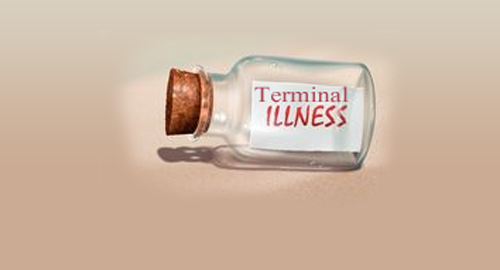- Clinic:
- 0733 945 717
- 0739 434 212

Volunteering as a lay health worker
February 14, 2025
Alcohol in pregnancy, is a little bit safe?
February 24, 2025Dealing with end of life illnesses

Terminal illness is a disease that cannot be cured or adequately treated, and is usually expected to result in death within a short period of time.
Terminal illness is mostly associated with cancer, though it may also relate to other conditions like advanced heart disease. In medical timelines, one is considered terminally ill if they are expected to die within six months. The six month standard is arbitrary though, and the estimation is never accurate.
The diagnosis of terminal illness, either in yourself or loved ones can be difficult to deal with. The realization of impending demise introduces a whole range of reactions. You will go through various stages of acceptance, ranging from disbelief to extreme anxiety, shock, despair and anger. Slipping into depression is real, and this may last for a few weeks or even throughout the course of the illness. The end goal is to find some acceptance of the diagnosis, and the eventual inevitability of death.
Decisions on medical management of terminal illness must be carefully considered. By definition, a cure or adequate treatment is unachievable. The focus then must be directed at easing suffering such as pain, breathing difficulties, feeding etc. Aggressive treatment in the hope of unexpected cure is usually futile. So is blind pursuance of unproven therapies that may range from herbal to complementary treatments. Resorting to palliative care to relieve symptoms and improve quality of life in the last days is a more practical approach. This can either be done at home surrounded by loved ones, or in a care facility such as a hospice.
More controversial end of life options have been in the limelight in the recent past.You may have heard of mercy killing, known as euthanasia in medical terms. This is the practice of medically-assisted suicide in terminally ill patients to prevent prolonged suffering, where the prospect of cure or realistic relief of extreme symptoms is non-existent. Euthanasia has gained more and more acceptance over the years, and is legally permissible in some countries. Various forms of euthanasia are available, ranging from self-administered lethal medications to physician assisted suicide in euthanasia clinics.
The decision to end your own life whilst faced with a terminal illness is not easy by any means. It must be well thought out whilst still of sound mind. Loved ones may find it hard to accept such a choice, but they may also get some relief once your suffering comes to an end. None of us really knows what goes through the minds of those suffering from terminal illnesses that can only end in one way. We cannot be prescriptive and overly judgmental. Our role is to facilitate care that respects hard choices and dignity when medical interventions can no longer sustain life. The terminally ill are entitled to choose when and how to die, even if we may find it unpalatable.
Take a fertility test today
